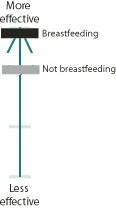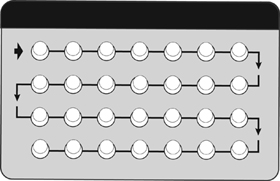CHAPTER 2
Progestin-Only Pills
This chapter focuses on progestin-only pills for breastfeeding women. Women who are not breastfeeding also can use progestin-only pills. Guidance that differs for women who are not breastfeeding is noted.
| Key Points for Providers and Clients |
- Take one pill every day. No breaks between packs.
- Safe for breastfeeding women and their babies. Progestin-only pills do not affect milk production.
- Add to the contraceptive effect of breastfeeding. Together, they provide effective pregnancy protection.
- Bleeding changes are common but not harmful. Typically, pills lengthen how long breastfeeding women have no monthly bleeding. For women having monthly bleeding, frequent or irregular bleeding is common.
- Can be given to a woman at any time to start later. If pregnancy cannot be ruled out, a provider can give her pills to take later, when her monthly bleeding begins.
|
| |
What Are Progestin-Only Pills?
- Pills that contain very low doses of a progestin like the natural hormone progesterone in a woman’s body.
- Do not contain estrogen, and so can be used throughout breastfeeding and by women who cannot use methods with estrogen.
- Progestin-only pills (POPs) are also called “minipills” and progestin-only oral contraceptives.
- Work primarily by:
- Thickening cervical mucus (this blocks sperm from meeting an egg)
- Disrupting the menstrual cycle, including preventing the release of eggs from the ovaries (ovulation)
How Effective?
Effectiveness depends on the user: For women who have monthly bleeding, risk of pregnancy is greatest if pills are taken late or missed completely.
 Breastfeeding women:
Breastfeeding women:
- As commonly used, about 1 pregnancy per 100 women using POPs over the first year. This means that 99 of every 100 women will not become pregnant.
- When pills are taken every day, less than 1 pregnancy per 100 women using POPs over the first year (3 per 1,000 women).
Less effective for women not breastfeeding:
- As commonly used, about 3 to 10 pregnancies per 100 women using POPs over the first year. This means that 90 to 97 of every 100 women will not become pregnant.
- When pills are taken every day at the same time, less than 1 pregnancy per 100 women using POPs over the first year (9 per 1,000 women).
Return of fertility after POPs are stopped: No delay
Protection against sexually transmitted infections (STIs): None

 Previous Chapter
Previous Chapter  Previous Page Next Page
Previous Page Next Page  Next Chapter
Next Chapter 